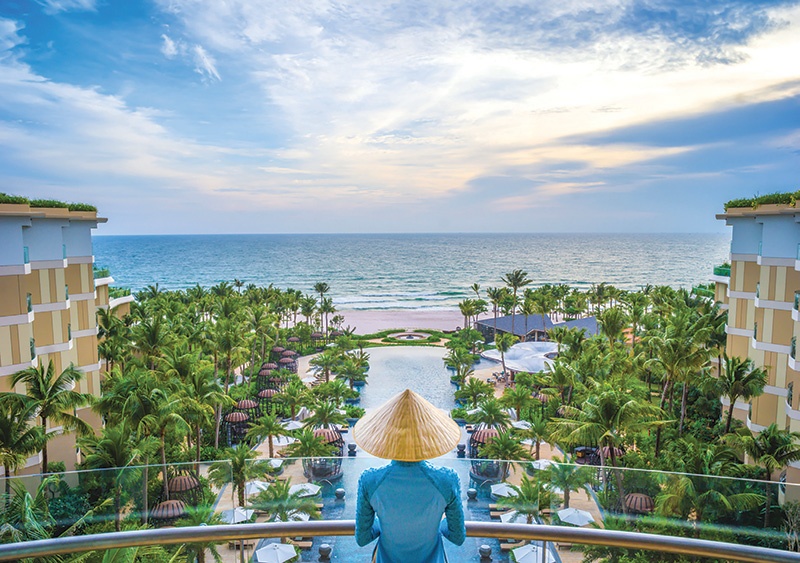Vietnam ever closer to opening international tourist Market
 |
| Vietnam ever closer to opening international tourist Market |
March 15 is still set as a major day for the country with the official reopening of international tourism after two full years. Policies on entry visas for foreign visitors will also be reintroduced, including e-visas and unilateral and bilateral visa exemptions.
Vietnam had exempted visas unilaterally for 13 countries and bilaterally for 88 countries or territories before the pandemic emerged.
The new regulation allows international tourists into Vietnam without having to register for a fixed tour or route as in the pilot period. All that will be required is a certificate of full vaccination against COVID-19 or evidence of recovering from the disease, with a negative test result before boarding. A prescribed health management app will have to be downloaded and turned on during your stay. In addition, any tourist can freely experience their journey without going through a travel agency.
All visitors are also required to have medical insurance or travel insurance covering the cost of COVID-19 treatment with coverage of $10,000 in case of illness.
For domestic tourists, localities will also rely on the pandemic situation of each area to prepare to welcome and serve tourists in safe conditions.
The opening has been prepared by the government for several months, based on experience gained from the pilot programme. In that, Vietnam has welcomed about 200,000 international visitors and is expected to welcome about 5-6 million international visitors this year. This number is much lower than 18 million international arrivals in 2019.
Ha Van Sieu, deputy general director of Vietnam National Administration of Tourism, said that the aviation industry has created favourable conditions for tourists to trust in Vietnam. Currently, there are about 20 countries and territories open to connect international routes with Vietnam, with about 30 routes and 30 airlines.
“Now is the time for tourism and aviation to quickly seize the opportunity to recover in the new context, making Vietnam a prestigious destination and lending it a competitive position in the international market,” Sieu said.
The recovery of the inbound tourist market has led to the revival of many destinations and tourism businesses whose revenue mainly relies on welcoming foreign tourists. Many places have taken the opportunity to prepare more attractive and quality new products to force tourists to increase both the length of stay and spending.
According to Nguyen Thi Anh Hoa, director of Ho Chi Minh City Department of Tourism, there will be a sightseeing programme to welcome international visitors back to the city in which a helicopter tour to see the city from above will become a new high-end experience.
Despite high expectations for the programme to open in mid-March, some businesses also expressed concern about its effectiveness as the new welcome process proposed by the Ministry of Health has more conditions that could put them at a disadvantage.
Under the new proposal, the health sector does not accept rapid test results for international guests and requires them not to leave the property within 24 hours of entry. During the second and third days, if a visitor wants to leave the residence, they must be tested for COVID-19 each day.
“We cannot show the discrimination towards international visitors when Vietnam still records more than 100,000 new cases per day. The possibility of international guests carrying COVID-19 from Vietnamese people is much higher than the possibility of them infecting us,” said Nguyen Tien Dat, AZA Travel’s general director.
Meanwhile, a representative of Images Travel commented, “Tourism is using money to buy happiness. No-one spends money to travel in fear.”
Images Travel said that it has refused some delegations who want to come to Vietnam in April and May due to unclear policies, and is only accepting some groups from September.
Representatives of international tourism businesses also suggested Vietnam learn from neighbouring countries to facilitate smooth procedures for tourists if they come to travel, such as the Phuket sandbox model of Thailand or the policy of exemption from PCR testing for tourists who have been vaccinated with enough vaccines, such as in Germany and Austria.
What the stars mean:
★ Poor ★ ★ Promising ★★★ Good ★★★★ Very good ★★★★★ Exceptional
Related Contents
Latest News
More News
- Manila becomes a new check-in destination for Vietnamese youth (December 11, 2025 | 18:07)
- Vietjet launches mega year-end ticket promotion (December 10, 2025 | 11:33)
- Dalat leads Vietnam’s 2025 search trends (December 09, 2025 | 13:44)
- Vietnam welcomes record wave of international visitors (December 09, 2025 | 13:43)
- Vietjet launches daily Manila flights to celebrate year-end festive peak season (December 05, 2025 | 13:47)
- The destinations powering Vietnam’s festive season travel demand (December 04, 2025 | 18:33)
- Vietnam named among the world’s most exciting winter destinations (December 04, 2025 | 15:10)
- Phu Tho emerges as northern Vietnam’s new tourism hub (December 01, 2025 | 17:00)
- Vietjet completes Airbus A320/A321 updates ahead of deadline (December 01, 2025 | 09:49)
- Vietjet resumes Con Dao flights from early December (November 28, 2025 | 15:24)

 Tag:
Tag:




















 Mobile Version
Mobile Version